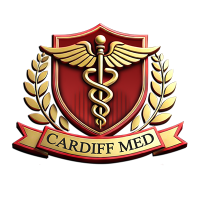MSc Pain Management
Master advanced pain management techniques with CardiffMED’s MSc program for healthcare professionals worldwide
Overview
The MSc in Pain Management equips healthcare professionals with advanced skills to effectively manage acute and chronic pain. This RCP-accredited, flexible online program focuses on interdisciplinary approaches, real-world case studies, and global collaboration. Designed for doctors, nurses, and allied health professionals, it enhances clinical expertise, promotes evidence-based practice, and broadens career opportunities in pain management.
Entry Requirements
Since our master's in pain management course is conducted entirely online, it's accessible to both UK and international registered healthcare professionals without any international surcharges.
Applicants for our chronic pain management courses will typically hold a first degree or equivalent (including international qualifications) in a relevant professional healthcare or management field.
Registered healthcare professionals or experienced managers working in the healthcare field, without these recognised qualifications, will be considered on an individual basis, and a wide range of prior experience may be taken into account. In some cases, applicants may be asked to submit a piece of work for assessment to confirm that they can work comfortably at a postgraduate level and demonstrate the requisite clinical and professional knowledge.
- A copy of your updated CV including your address and date of birth.
- A copy of your undergraduate degree certificate.
- The name and email address of someone who is able to provide a reference, this can be a work colleague, employer or former tutor.
- A detailed personal statement explaining why you would like to undertake the course.
- A copy of your proof of English competency (see below).
Proficiency in the English language is also essential to completing our courses. If English is NOT your first language, we ask for proof of competency during the application process. We are able to accept an IELTS (with an overall score of 6.5 and a minimum of 6.0 for each band) or an equivalent qualification.
If you do not meet these requirements, please don’t worry, you can also contact our admissions team on admissions@cardiffmed.com for more information on the qualifications we accept.
Should you have already successfully completed the 1 year Postgraduate Diploma and wish to convert to the MSc and complete only the second year of the program this is possible. Please contact our admissions department info@cardiffmed.com to find out more.
Key Facts
- Awarding University
- Starting Date: 1st September 2025
- Application Deadline : 29th August 2025
- Class Size : 15 - 20
- Duration : 24 months
- Commitment : Part-time
- Format : 100% Online
Course Fees
- Deposit for September 2025: £420 †
- Total Course Fees for UK & International Students for September 2025: £9,440 ††
Payment Options
- Option 1: Upfront Payment in full. Pay-in-full discount is available.
- Option 2: Apply for Interest-free payments each month for the duration of the course.
Payment Plan Breakdown
First Year Payments
| Deposit | 10 Monthly Payments | Final Payment |
| £420 † | £420 | £420 |
Total first year payments: £5,040
Second Year Payments
| 11 Monthly Payments | Final Payment |
| £366 | £374 |
Total second year payments: £4,400
You may also be interested in:
- Spread the cost with Lendwise, who offer financing options for up to 8 years. ††††
† Deposits are non-refundable
†† Prices are subject to review following each intake
†††† Subject to eligibility criteria.
Course Modules and Learning Outcomes
The master’s in pain management is a two-year course, consisting of eight modules (180 credits) with the first 120 credits deriving from the Postgraduate Diploma. The second year of the master’s in pain management starts with an initial 10-week online module that will develop skills in critical appraisal and knowledge of research methodologies. Students then complete the professional project module, which consists of a 1,500-word proposal and a 10,500-word professional project (dissertation).
Year 1
Module Aims
To develop an advanced understanding and knowledge of the underpinning causes and associated experiences of pain.
Module Content
- History and epidemiology. Biopsychosocial model with gender consideration
- Chronic versus acute pain e.g. distinctions
- Pain science e.g. physiology of pain systems and syndromes. Taxonomy of pain systems
- Current evidence/research
- Severe pain syndromes
- Patient considerations (spiritual/social/ethical/occupational)
- Global impact on a person in pain (spiritual/social/ethical/occupational)
Learning Outcomes
- Application of the biopsychosocial model to the varied presentations of pain
- Apply knowledge of complex pain mechanisms to the differentiation between, and impact of, acute and chronic pain
Module Aims
Enhance the knowledge and understanding of different types of pain with an emphasis on clinical importance.
Module Content
- ISP taxonomy of different types of pain
- Acute vs. chronic. Importance of early recognition and prevention of chronicity. Clinically important aspects of acute and chronic pain; difference between nociceptive and neuropathic pain.
- Cancer/Visceral
- Headache/Neuropathic
- Fibromyalgia/musculoskeletal
- Understanding of pain changes in the light of new evidence
Learning Outcomes
- Critically discriminate between different types of pain
- Demonstrate knowledge of the complex clinical considerations that need to be taken into account in different types of pain
Module Aims
To develop a critical knowledge of the clinical principles and practice of pain assessment and management.
Module Content
- Assessment
- Measurement
- Diagnosis and Prognosis
- Treatment modalities - Primary Care (British Society Guidance 26/8)
- Alternative treatment modalities
- Clinical management (British Society Guidance 28/30)
- Roles, responsibilities and management
Learning Outcomes
- Critically analyze the assessment and treatment of patients with different pain presentations.
- Critically appraise treatment modalities in different clinical scenarios
Module Aims
To develop an understanding of different treatment approaches to pain within the context of overall approach to pain management.
Module Content
- Physiology/Pharmacology /Medication
- Psychology/Cognitive Behaviour
- Manual therapies
- Patient Education/Self-Management/ Preventative Education
- Functional Rehabilitation
- Surgery and Post Surgery Care
- Deployment of different modalities for maximum effect
Learning Outcomes
- Critically analyse current evidence related to multi-disciplinary approach of treating different types of pain
- Critically evaluate the risk and benefits of different approaches to pain management
Module Aims
Students will have an understanding and appreciation of pain across the life-span and experience.
Module Content
- Older People
- Infants and children
- Disabilities including those with limited communication skills
- Pregnancy
- Vulnerable populations
- Pain in individuals with substance abuse
- Looking at how pain will present itself in all groups
- Considering similarities and differences
- Physical and psychological disorders
- How pain changes
- How to communicate in pain and cognitive impairment
- Working with vulnerable populations (mental health issues, homelessness, learning disabilities, delirium, dementia)
- Social aspects of pain (stigma, social isolation, labelling stigma, labelling isolations)
- Enhancing communication with different social groups
Learning Outcomes
- Demonstrate ability to manage pain in a variety of complex situations and /or populations
- Demonstrate ability to communicate with populations who have complex/specific or changing needs
Module Aims
To draw on the knowledge and understanding of previous modules to critically evaluate the development of interdisciplinary pain services
Module Content
- Evidence supporting interdisciplinary and multidisciplinary of pain
- Organizational services The consequences and influence rising from organizations
- The management team in a clinical setting
- The role of evaluating organizations, clinical settings (the way care is organized)
- The realistic expectations of the practitioner and career
- Emerging ideas of services
- How emerging updated guidelines and impact of services
Learning Outcomes
- Critically analyze the benefits of inter and multidisciplinary pain management in a clinical setting and the consequences within healthcare schemes
- Demonstrate expertise in organizing approaches to pain management
Year 2
Aims of the module:
To prepare students for an independent research-based project by developing skills in selecting, appraising, discriminating, using evidence and appropriate research/investigative methods to address relevant topics for investigation.
Module Content:
- Quantitative Studies
- Statistical Analysis Interpretation
- Interpreting the Evidence
- Meta-analysis and Systematic Reviews
- Qualitative Studies
- Evidence Appraisal: Interpreting, Weighing and Synthesizing the Evidence
- Audit, Governance and Quality Improvement, Health Economics
- Preparing a Research Proposal: Research Committees, Consent, Ethics, Probity and Literature Review
Learning outcomes:
- Critically analyze and interpret research to assess its application to delivery/service development.
- Evaluate and synthesize diverse methodological approaches and research tools to formulate and investigate complex questions within your field of practice.
Aims of the module:
- To formulate the research question that you seek to answer.
- To develop an ability to critically evaluate areas of professional practice.
- To critically appraise specific areas of clinical, research and organizational practice.
- To develop skills in independent research and study.
- To develop skills relevant to scientific publications.
Module Content:
The module will depend on the creation of a piece of work based upon a specific pain management related project relevant to the student’s practice. This project may comprise:
- Systematic literature review and appraisal of the evidence.
- Audit of non-patient data/organizational audit
- Review and implementation of evidence-based practice.
- Literature review and qualitative or quantitative research proposal.
- Case(s)-based and quality of service review with critical appraisal.
- Case report, review of literature and organizational assessment.
- Secondary data analysis.
Learning outcomes:
- Synthesize advanced knowledge of pain management research to conceptualize, plan, and execute an original investigation that contributes significant insights to the field.
- Critically evaluate practice and suggest improvements or change in a pain management setting.
Incorporate knowledge of the research process in developing pain management services appropriately.
Programme Leader
The hospital plays a statewide services includes the Acquired

Dr Sunil Dasari
Tutor

Dr. Tzvetanka Ivanova-Stoilova
Programme Leader
Consultant in Anesthesia and Pain Medicine, Aneurin Bevan University Health Board

Dr. Tzvetanka Ivanova-Stoilova
Programme Leader

Patricia Schofield
Tutor
Patricia was one of the first pain specialist nurses in the UK and set up the acute and chronic pain services.
Validated and Supported by Trusted Institutions
Validating partner
The University of South Wales (USW)
Accreditors and Endorsers
UEMS
Assessment Methods
This programme emphasises learning through active participation in case-based discussions, reflection, and real-life scenarios. Students engage with clinical cases that mirror everyday practice, fostering problem-solving and evidence-based application from the very beginning.
Across the modules, assessments are integrated with learning. Each week, you will work through two to three clinical cases, discussing and reflecting on them with peers under the guidance of an expert tutor. These discussions form the core of your learning and are also the basis for your assessments.
Our innovative teaching methods are designed to help you translate this learning into real-world clinical practice. You’ll need to regularly log in to participate in discussions, ideally daily, and commit approximately two hours per day to your studies. Our dedicated Student Support Team is available to assist with any challenges you may encounter, from navigating our online platform to managing deadlines.
How Foundational Knowledge is Developed
The programme is structured so that foundational knowledge is introduced through carefully designed clinical cases. Each case is crafted to highlight essential concepts and progressively deepen your understanding as you apply critical thinking and evidence-based analysis. This hands-on approach ensures that you are not only acquiring theoretical knowledge but also learning how to apply it in a practical, clinical setting.
This programme is suited for professionals who thrive in an online, discussion-based learning environment. This course focuses on interactive, applied learning through peer collaboration and case discussions. You will be fully supported, encouraged, and led through the programme to success and graduation!
Year 1
- Every week students are presented with two/three clinical case-based scenarios that are reflective of every day clinical practice and research.
- Tutors will post a number of questions and prompts to aid students in a formal discussion of each case.
- These discussions are facilitated throughout by your tutor and are then assessed at the end of every module.
For this assessment, students will work on a group assignment and/or an individual assignment.
- Group assignments are designed to hone skills in the multidisciplinary, holistic approach to modern treatments and patient management by requiring group participation in a single piece of work.
- Individual assignments are designed to hone skills in academic career progression through such tasks as reviewing papers, developing scientific posters or abstracts, peer-reviewing, social media activities, patient information leaflets and essays.
The reflective journal is used by students throughout each module to monitor personal progress. This is guided by weekly feedback from your tutor and is graded at the end of every module. The journal typically includes the following:
- Initial expectations and reasons for taking the course.
- Module and/or personal learning objectives.
- Description of events, issues and learning points within current personal practice.
- Change in every day practice due to knowledge gained on each module.
- A description of what has been learned during the module.
- Students are provided with case-based problems in the form of a one-hour timed examination.
- The exam consists of 30 'Single Best Answer' questions.
- Students are required to complete the exam online within the set time.
Year 2
This module runs over an 8 week period and is designed to develop skills in critical appraisal and knowledge of research methodologies. The module consists of mandatory formative assessment activities to support your learning and development prior to the Professional Project module.
Students will work with their supervisor to submit a professional project proposal for their chosen topic.
Students will deliver an abstract (1000 words) outlining their proposal and, if deemed necessary, develop and submit documentation for the University’s ethical committee approval.
- Students will create a dissertation, the theme of which has been developed in discussion with their tutor.
- Supervision will normally involve direct online support involving planned progress, supporting research activity and reading student work.
- Supervisors and students will agree on a communications plan, which may involve emails or online chats. Some students may employ the use of freely available chat or audio conferencing facilities for live discussion with supervisors.
- Students will have access to online forums where they can develop their research capabilities together.
- All communications with tutors will be logged on the Professional Project forum by the student, and consist of brief summaries of discussion.
Why Study Pain Management Master's with CardiffMED
100% Flexible
Our courses are 100% online. No fixed study times mean you can log in and learn whenever and wherever.
Multidisciplinary – study in a group of doctors, nurses, pharmacists and other healthcare professionals.

Career Boosting
Get a University-validated postgraduate qualification in just 1 calendar year instead of 2 academic years.
40% of our alumni reported a salary increase 2 years after studying with us.

Expert Led
All of our programmes are authored and developed by world-leading experts in their field.
Our faculty are selected due to their subject expertise, experience, and teaching abilities to ensure the highest standards of educational excellence.

Our master's in pain management is ideal for:
- Doctors
- Nurses
- Allied Health Professionals
- Practice Nurses
Also those with related undergraduate degrees (such as Clinical Nurse Specialists, Physiotherapists, Chiropractors, Osteopaths, Dentists, Psychologists, Occupational Therapists, Podiatrists and Rehabilitation Specialists) or equivalent professional qualifications and background experience who wish to gain specialist knowledge in the field of Chronic Pain Management.
You'll learn through our flexible, interactive online platform, which allows you to engage with clinical cases, complete assignments, and collaborate with fellow students at times that suit your schedule. There's no fixed timetable—simply log in daily to participate in the week's activities.
Our teaching approach is highly interactive, using small groups of 10-20 students to foster a collaborative environment where you can engage in thoughtful discussions and receive guidance from your tutor. You'll have access to learning resources and discussion forums that encourage ongoing interaction and deeper engagement with the material.
Throughout your studies, you'll receive support from a dedicated expert tutor and our Student Support Team, ensuring you have the resources needed to navigate the course successfully.
Why Enroll in This Program
Awarding University
University of South Wales
Our Expertise in Pain Management
At CardiffMED, we offer globally recognized, RCP-accredited Pain Management programs designed for healthcare professionals. Combining clinical excellence with flexible online learning, we help you elevate your expertise in managing pain-related conditions effectively.





